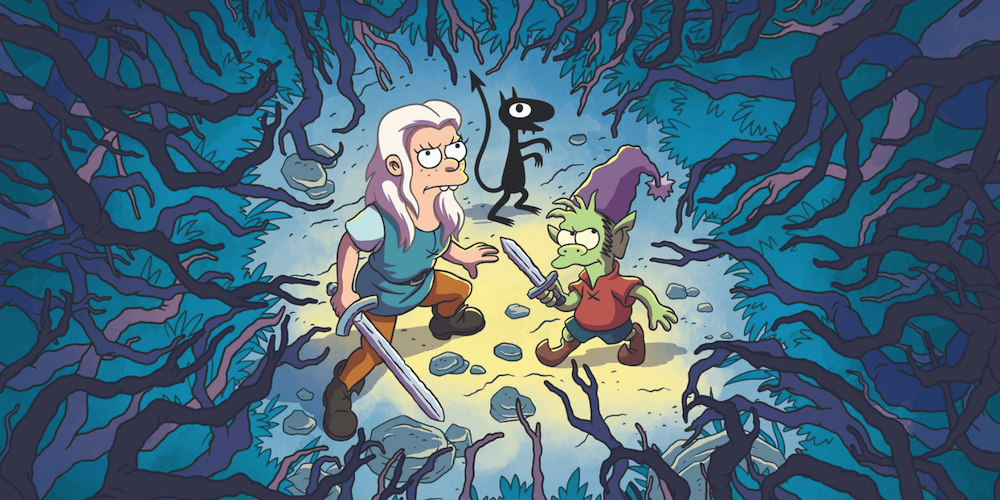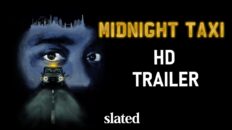Set in medieval times, Disenchantment tells the story of rebellious, alcoholic princess Tiabeanie, or Bean (Abbi Jacobson), as she struggles with the expectations of her father, King Zøg (John Dimaggio). Joining her are an optimistic elf, Elfo (Nat Faxon), who escapes from his overly-cheerful home in search of adventure, and Bean’s ‘personal demon,’ Luci (Eric Andre), who is often mistaken for her pet cat.
Disenchantment’s first ten episodes premiered in mid-August and marked three distinct firsts for Groening:
- All episodes dropped at once on Netflix;
- It delves into the fantasy genre;
- And the story, though casual and slow-moving, is told in a serialized fashion.
Offering the show up on Netflix is arguably the best move of the three. Since Groening’s audience tends to be young males of a generation that has become accustomed to binge-watching a series, the platform complements the show perfectly. I have no doubt that many of Disenchantment’s viewers powered through the show in its first weekend.
The choice of genre is hit or miss. Thanks to properties like Game of Thrones, fantasy is in fashion and it’s nice to see Groening try something new. However, some of the medieval humor felt a little stale. Many of the jokes in the first handful of episodes failed to land, in fact. I was barely into my teens when Futurama premiered, but I do seem to remember instantly connecting with the show and its sense of humor. That didn’t happen with Disenchantment. But I never rule out shows with potential because they have a rocky start.
The most interesting quality of this cartoon is its serialization. Though the episodes are easily separated, they still lead into each other directly, prior events are referenced, and the entire season is mildly preoccupied with an overarching plot about finding the elixir of life. Disenchantment isn’t the first adult cartoon sitcom to attempt serialization—South Park and Archer both spent a few of their recent seasons feeling the format out, to mixed reception—but it’s a first for Groening. The allegiance to continuity made the show feel more dramatic, and it was easy to follow since all the episodes dropped at once. It even ended on a cliffhanger, compelling the viewer to wonder what happens next, instead of just forgetting about the show until the next batch of episodes airs.
Abbi Jacobson (Broad City) is the perfect choice for Bean but many of the other characters feel re-hashed from Groening’s other shows. Eric Andre’s Luci has fan favorite written all over him, but in spite of his flippant attitude and devil-on-the-shoulder tendencies, he is no Bender. Bean’s stream of unappealing suitors harken back to Futurama’s Zapp Brannigan and it doesn’t help that nearly every voice actor on Futurama shows up in Disenchantment. Finally, Elfo may not act like the eldest Simpson child, but he looks so much like Bart that it’s hard to unsee it. Elfo was also the biggest ‘miss’ of this series, for me; the first time we meet the elf, he is rejecting his culture because he’s sick of the forced positivity and wishes to experience negative emotions for the first time in his life. The moment he joins Bean and Luci, though, their irresponsibility and apathy shoehorn Elfo back into the optimistic role he just escaped. His relentless unrequited crush on Bean felt forced and awkward since everything about Elfo makes him seem like a child discovering the world for the first time and his feelings obviously were not reciprocated.
In spite of the show’s obvious flaws, I found myself more invested as it went along and will continue watching when she second batch of episodes airs. As fun as it is hearing the old familiar voices I grew up with, the show may benefit from branching out more and establishing its own slew of voice actors. The serialized format is currently the most unique thing about Disenchantment and the thing which will keep viewers coming back for more, but there is something to be said about the show’s respect for dramatic moments. It might be jarring at first, but some of Futurama’s most memorable moments came from the heart, and thinking about those moments—Fry’s dog, the Robot Devil’s hands, Yancy Fry’s seven leaf clover—makes me believe that Disenchantment is capable of so much more than what we’ve seen so far. The key is to focus on the characters—once the audience truly cares about them as people, the feelings follow naturally.








